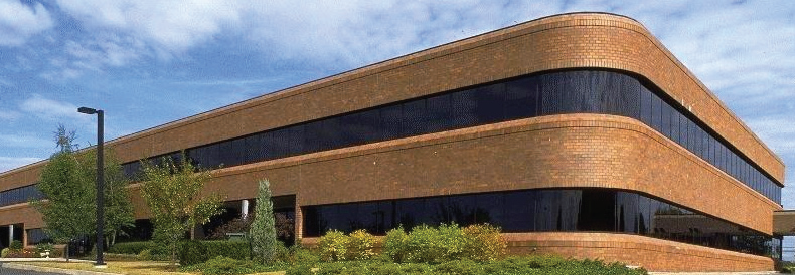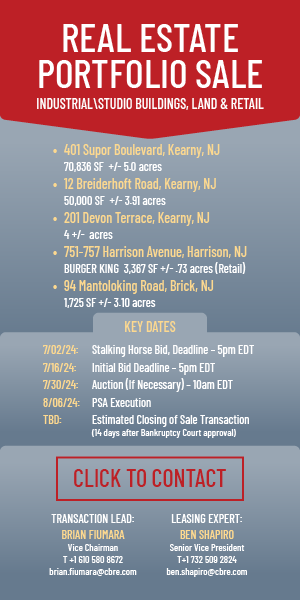From left: Joel Natter, vice president; Jordan Zimmel, vice president; David Zimmel, CEO and president; Jaime Zimmel, vice president; and Jason Zimmel, sales associate, make up the team at Zimmel Associates. — Courtesy: Zimmel Associates
By Joshua Burd
For a business that is teeming with competition, Zimmel Associates has held steady as a boutique, family-owned brokerage firm in New Jersey for more than three decades.
As David Zimmel will tell you, it’s helpful to have clients who are willing to stick around.
“One thing that we’ve been very fortunate about is we’ve had several very loyal, long-term clients that have stayed with us a long period of time,” said Zimmel, the co-founder and president of the Edison-based firm. “I’m talking around 30 years.”

That includes multigenerational owners such as Denholtz Associates and Tucker Enterprises. For Zimmel, that continuity goes hand in hand with a business that he founded with his late father, Bernard Zimmel, and one that now includes a third generation. Not one, but three of Zimmel’s four sons work at Zimmel Associates today, positioning it for continued success in the years ahead.
The brokerage firm, which has exclusive assignments for around 5 million square feet of industrial, office and flex space in the state, has built the business with a focus on representing landlords. Like others who work in the industrial sector, Zimmel is benefiting from the surging demand for warehouse and distribution space in New Jersey.
“In my whole career, I have never seen anything like this before,” Zimmel said, noting that vacancy is around 4 percent in northern and central New Jersey and even lower in the strongest submarkets.
Zimmel, who originally planned to attend law school, instead entered the real estate business at age 21, joining his father in 1978 at what would become The Blau & Berg Co. During the course of about seven years, the tandem was among the top earners for the firm, which provided a strong foundation for the younger Zimmel.
“My father was, I think, one of the best brokers around, and at the time there were a couple of really seasoned guys that I consider to be icons in the business,” he said, pointing to the likes of Ted Stein. “I was very fortunate that I was able to learn from them, so I picked things up.”
By 1986, when Zimmel was beginning to think about the next stage of his career, developer and client Jack Denholtz suggested that the father-son duo start their own firm. He recalls that his father, who was 58 at the time, had reservations about leaving his company of 20 years, but ultimately came around to the idea.
In the years that followed, the family grew its business with the help of several longtime clients such as Denholtz and Larry Berger of United States Land Resources Inc. In doing so, Zimmel and his father continued their focus on finding exclusive leasing assignments from landlords, which would often lead to new business with tenants.
To this day, the firm continues to be “very owner- and landlord-oriented,” Zimmel said. About 11 years ago, the firm moved from its original office in the Metropark section of Edison to its current home within Raritan Center, in an office park in which it serves as the leasing agent.

RELATED: Zimmel brokers $12.6 million in warehouse, office sales
Bernard Zimmel died in 2014. But by that time, two of David’s four sons, Jordan and Jaime, had joined the family business. His youngest son Jason came aboard full-time earlier this year after studying at Monmouth University’s Kislak Real Estate Institute.
His oldest son Jared is also in real estate, serving as a vice president with Natixis Global Asset Management in Manhattan. But it was not necessarily by design for his sons, who range in age from 24 to 35, to continue the family tradition.
“I really didn’t push them at all,” Zimmel said. “Fortunately, things have worked out, but it’s not an easy business, and I in no way encouraged them. I think that maybe they saw the success that my father and I had and they became interested in it.”
Real Estate NJ sat down with Zimmel recently to talk about the firm’s history and its outlook going forward. Below are excerpts from the interview.
Real Estate NJ: You started your career as an industrial broker, but Zimmel Associates also works with office space. How did that all come to be and how has that helped the business?
David Zimmel: I certainly started in industrial. Office space became popular in the mid ’80s, so I learned both office and industrial. That’s actually been a blessing for me because during the 30-year timeframe, sometimes the office market is stronger than the industrial market, and sometimes the office market is weak and the industrial space is not. I’ve had the ability to really go back and forth. I do both all the time, but I’m not pigeonholed and locked in. Some of the bigger houses … require you to stay in one section and that’s it. So I kind of like the fact that I have the ability to roam a little bit.
The other part of it is that … we came into a recession in the early ’90s, to a point where it just didn’t make any sense to build. So I had met Larry Berger, who I still do business with. He was the first person that I came across who would buy an empty warehouse building … so I started doing some deals with him and got my feet wet in investment real estate, so to speak. His mantra was that if you sold him a building, he would let you do the leasing. So you got kind of a double hit, which to me was interesting and made a lot of sense.
RENJ: You talked about this unprecedented level of activity in the industrial market. How do you approach tenant relationships and renewals in a market like this?
DZ: My father always taught me — and I try to teach my kids — never lose touch with the tenants. Once you rent the space, don’t not call them for five years. If you’re in the area, stop in and say hello. It’s time, but I believe the one thing that we have over a lot of companies is we’ve got very good relationships that we’ve built up with people. And you have to stay in touch with people. You can’t just call them every five years and expect that something is going to happen. Plus, when you go and visit people that you’ve rented space to, sometimes they might have a friend they would recommend, or they bought another company. The long and short of it is we try to stay in touch with people.
So what we do is we try to get to them early enough whereby we can educate them as to what’s going on in the market. And in many cases, especially during the recession, we suggested to a lot of tenants to try to extend their lease at that time and lock in at lower rents so they weren’t exposed to higher rents like when we’re in a market like this. That went pretty well.
Now we’re going back to tenants because there is a lack of space, and if a tenant really is going to enter the market because maybe they outgrew their space, you need extra time today to go out and find something because it’s not that readily available.
RENJ: With that in mind, what are some of the deals you’ve worked on recently?
DZ: We just sold an 85,000-square-foot building in Avenel. That was a perfect example. We put that building on the market and we had about 10 offers within the first three weeks. We got a very high price, but it was based on supply and demand.
Most of our flex at the moment is 100 percent leased. What we’ve been experiencing during the last six months is that most of the flex tenants, when we go to them, they’re not moving. They’re staying unless there’s a real serious need for additional space, but they know how tight the market is and there’s just not that much availability.
We’ve got two 20,000-square-foot buildings, one in Piscataway, one in Carteret, that are available that I don’t think will be available for a long period of time. We don’t have a lot of vacancy in industrial right now, so we have a lot of clients that have contacted us on our buildings that are looking for industrial and we’re trying to satisfy their needs. But there’s not a lot of space out there, so you really just have to stay on it every day, talking to owners, staying on CoStar or LoopNet and seeing if something pops up so that you can jump on it.
RENJ: It has to be good when the market is this active, but I would imagine it’s also challenging when vacancy is so tight. How do you navigate that?
DZ: Ultimately, when the market is tight, there are always deals that are made. You have to work harder, you have to work smarter and there are certain things that we do. As an example, I tell my boys don’t just rely on CoStar. There are certain owners … and you’ve got to call them every single time you have a requirement. It takes time. When you send an email and say, ‘Do you have any space?’ and they say no, the conversation ends there. If you talk to them and say, ‘Well, do you have something in three months or six months?’ — by talking, things lead to other things. So you have to put that extra effort in, and I think by putting that extra effort in, you get something out of it at the end. And that’s what separates you from what I’d call an average broker.
RENJ: You must be doing something right to have been in business for so long.
DZ: We’re a small, boutique company, but I like to think that our knowledge of the market, our loyalty to our clients and our effectiveness (separate us). We wouldn’t represent people for 30 years if we weren’t effective. With the online listings today and the information that’s available on the internet, I still think that a company like ours, that’s a boutique-type company, can certainly compete against the bigger companies, because our information is just as good as their information. We’re really drawing on the same sources that they’re drawing on, and once you get to that point, it’s an individual business.
We’re at a point now where everyone’s got a fair amount of time under their belt. I think they’ve learned the right way, they’re extremely knowledgeable, they’ve followed in my footsteps about having their hand on the pulse of what’s going on and it’s worked. And I’m hoping that they will cultivate their own relationships like I did and pick up additional clients along the way.
Flex appeal
The idea of flex space goes hand in hand with the Zimmel family legacy.
According to David Zimmel, his father Bernard pioneered the flex concept in the late 1960s alongside developer Jack Denholtz, who constructed the first such building in Rahway nearly 50 years ago. Denholtz went on to build several more around central New Jersey, laying the groundwork for a market that remains a focal point for Edison-based Zimmel Associates.
Zimmel calls flex buildings “one of my favorite products” because they lend themselves to multiple tenants, allowing the owner to lower its risk and soften the blow of a flagging market. One downside, he said, is that they are expensive to build because of the need to divide the structure and mechanical systems and create additional parking to support the larger portion of office space.
That office space can amount to around 20 to 25 percent of the building, Zimmel said, whereas a typical industrial building calls for 10 to 15 percent. All that has created a tight market for flex space.
“Given the choice, a lot of landlords would prefer to build big box, because they can take advantage and build more square footage,” Zimmel said. “However, there’s a big need for flex and I think it’s a very popular product.”










